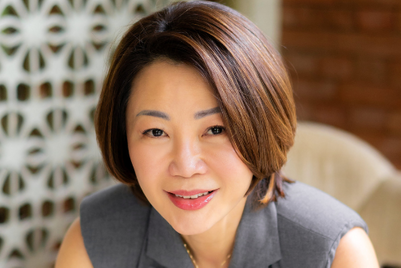
During a fireside chat on influencer marketing at PRWeek’s Influencer360 conference, Firdaous El Honsali (pictured), Dove’s vice-president of external communications and sustainability – beauty and wellbeing PR, influencer marketing lead at Unilever, explained that the “magic” is “human relationships”.
She said: “The magic is the relationship, it’s building that long-term. It’s investing in people, that’s not something you can explain through data. That is something you can only explain through human relationships.”
El Honsali argued that “science is data” and you need strong relationships as well as that data. “One doesn’t work without the other.”
She added: “The science is critical. We know what types of content resonate with our audiences because we’ve spent years analysing data and understanding what works and what doesn’t for our brand.
“Which types of influencers we need to work with… understanding what the competition is doing, understanding which types of ingredients are they using… the platforms, and also understanding what level of brand contribution you need to actually deliver on the funnel.”
Authenticity is key
Speaking at the conference last week, El Honsali contended that content must be “highly authentic”, even when it’s paid content, and that brands need to build trust with influencers.
She added: “The content doesn’t matter… What matters is the authenticity of the content.”
“The authenticity and the trust is not something that we built overnight,” El Honsali explained. In her view, brands cannot just follow influencers on social media, they must cultivate a community of influencers. This means they need to invest time and build a close relationship, and they need to listen and understand what the influencers “do best”.
Having a close, open relationship with influencers enables brands to react faster to comms and current trends, said El Honsali. She argued that brands can’t be agile if they don’t have an ‘always on’ influencer community.
“It’s impossible, you can’t do this work,” she said. “You can plan things, for example, six months in advance, three months in advance; maybe, if you’re agile, one month in advance… but doing something [in] 24 or 72 hours is impossible if you don’t have long-term relationships with influencers and if you don’t work with them in a way that there is massive trust.”
Brands also need a “clear point of view” to be agile and to resonate with their audience, said El Honsali.
Tackling digital distortion
During the panel session at the one-day Influencer360 event in Brighton, El Honsali explained how, over the past 20 years, Unilever and its brands such as Dove, have been campaigning to challenge stereotypes and “change the narrative” for women and girls around the concept of “perfect beauty”.
She said that, during the pandemic, women and girls reportedly spent more time on social media. And according to the comms leader, 80 per cent of girls have retouched imagery they’ve shared on social media before reaching the age of 13. Young girls are copying influencers who distort their imagery online, added El Honsali.
However, she said it was criticism of a social media app that filtered images that lead to the ‘Reverse Selfie’ Dove campaign, which aimed to challenge digital distortion and highlight its impact on mental health. According to the comms boss, influencers that had a long-term relationship with Dove came directly to the brand wanting to tackle digital distortion on social media.
Commenting on the app, she said: “This is beyond distortion. You can’t tell me this is creative play. It’s true, people use filters for creative play and it’s really exciting, but now this was like taking the play away and it was just full digital distortion.”
As a result, Dove worked with “influencers to speak on the brand, rather than the brand speaking about itself,” explained El Honsali.
Working with influencers
Commenting on new products and innovation, El Honsali said influencer marketing doesn’t have to be a space where you ‘push’ innovations or new products; it can also be a space “where you listen and look at what is happening culturally”.
It’s important for her to “resonate with the influencer communities” rather than just pushing Unilever innovations, she said.
She gave examples, such as Simple’s myth-busting campaign with influencers to combat misinformation on social media and Vaseline’s ‘slugging’ trend, which appeared during the pandemic. ‘Slugging’ is a nighttime skin routine where Vaseline is applied in a thin layer to the face.
Commenting on the social-media trend, El Honsali said there was “massive organic love around Vaseline”, particularly in the UK, US and Canada.
Rather than reinventing the wheel and creating new content, the business went to influencers who had created that “organic love” on the trend and used the original content in partnership with the influencers, pushing it through paid content.
“It performed brilliantly, it was more engaging,” said El Honsali. “It was delivering better results in terms of ROI than a traditional brand campaign.”
She concluded that brands need to be agile in delivering influencer campaigns, not only in reacting to them.




.jpg&h=334&w=500&q=100&v=20250320&c=1)


.jpg&h=334&w=500&q=100&v=20250320&c=1)


.jpg&h=334&w=500&q=100&v=20250320&c=1)






.png&h=268&w=401&q=100&v=20250320&c=1)

.jpg&h=268&w=401&q=100&v=20250320&c=1)
